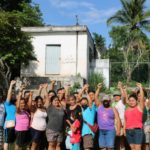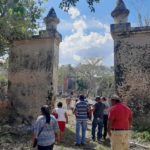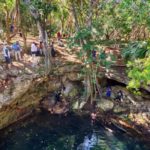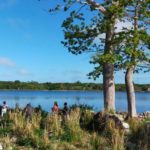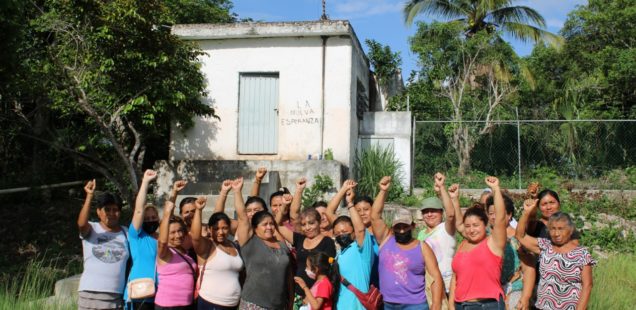
The guardians of the land (Kanan Lu’um Moo) of Chapab de las Flores (Yucatan, Mexico) confront polluting ‘development’ by taking control of their territory, promoting alternative livelihoods, and protecting their Mayan knowledge, customs, seeds, and ways of life.
Chapab de las Flores is an indigenous Mayan community located in the central-western part of the Yucatan Peninsula (Mexico), a region with rich biodiversity, abundant forest vegetation and water resources, thanks to the cenotes— natural pits resulting from the collapse of limestone bedrock that expose groundwater. The community maintains many customs inherited from generation to generation, preserving a close connection with nature and the land as primordial element of life. The people dedicate themselves to diverse activities, some still preserve traditional practices of milpa and the sowing of diverse crops. Due to its proximity to Ticul, a much larger community, a significant number of people in Chapab commute to that community every day to work. Likewise, migration to the United States is historical, due to the lack of opportunities and the neglect of the Mexican state.
For several years now, a mega-pig farm has been established in the community, where an average of 48,000 pigs are kept. The installation of the farm was approved by all the environmental authorities of Yucatan, but without prior local consultation and without informing about the socio-environmental impacts that the activity could have on the community. The inhabitants of Chapab have witnessed the dumping of water with pig excrement into the community’s hillsides, which has led to water contamination, the death of vegetation preserved by the community, as well as an increase in bad odours and disease vectors such as flies and mosquitoes. Despite the contamination, the farm justifies its permanence as a source of employment, as the community is characterised by historical poverty due to the abandonment of the countryside by governments and extensive migration. Indeed, the pig company has hired a significant number of Chapab residents as part of its strategy to fragment the community and avoid local opposition.
However, part of the community has organised itself into a collective called “Kanan Lu’um Moo” (Guardians of the land), to defend itself against the contamination and generate livelihoods alternatives to counteract the discourse that maintains the imposition of the farm. The collective includes individuals and groups of ejidatarios and has gone through various difficulties to confront the pollution, the corruption of local authorities, and the farm’s actions to break community solidarity. Throughout the struggle it has been particularly difficult to get young people involved, as the pig farm has co-opted youth groups into football and softball teams, and hires young people, pressuring them to sabotage the collective’s activities.
Since 2019, the collective has established a legal fight with legal actions against the pollution. Beyond this, their idea is to re-appropriate their territory, through care and administration by people from the community itself. The vision is also to create a space for community tourism as an economic alternative for the families, demonstrating that there are other work options— far from the daily pollution and the capitalist economy— that allow them to live in dignity and protect the territory. To this end, in September 2021 the members of the collective and other interested villagers began the refurbishing of an old bicycle road that connects a former hacienda house called “Kanan Lu’um”, four cenotes (called Yaxha and Cutzi) and a lagoon called Polol. All of them are located on lands that are under a collective property regime in Chapab.
In parallel, the community has a “Unidad Agrícola Industrial de la Mujer” (UAIM) which consists of a portion of land whose use is exclusively for productive activities that the women of the community may decide to carry out. The UAIM of Chapab was founded fifteen years ago and was initially mismanaged. At the moment, the UAIM’s territory is still being re-appropriated by new people from the community, close to the Kanan Lu’um moo collective, who want to pass on their ancestral knowledge of planting, which still exists, to the younger women. As part of this reappropriation, the women renamed the UAIM “New Hope” and have managed to group together 40 older and younger women from Chapab, who meet twice a week to work on the land.
The initiative proposed by the community and financed by the Feyerabend Foundation focuses on actions to reappropriate and collectively defend the territory through meetings, discussions, mapping of the territory and community work. The initiative includes: 1. legal actions to defend the rights of the inhabitants of Chapab against pollution; 2. the opening of a space for community conservation and the development of alternative activities such as mountain biking tourism; 3. the sowing and production of ancestral seeds in the collective production space of the women of Chapab.
For point 1. advocacy actions will be undertaken before the courts and other authorities, due to the omissions that have led to the contamination of the community’s environment. These initiatives are ongoing and will be continued. On point 2) the community has earmarked a significant portion of land for conservation and the development of a community tourism and mountain biking project. The initiative seeks to generate income for the community, intervening as little as possible in the territory and generating sufficient conditions for the safe use of the area. Finally, point 3) seeks the reappropriation of the territory through the planting of crops on a 2-hectare plot of land called ‘New Hope’. In this space, in addition to cultivation, there will be an exchange of knowledge between older and younger women in the community, as the former still have ancestral knowledge about planting that they wish to share with the younger women.
All the components of the initiative are a local response to the extractivism that has been imposed upon the community. They focus on the needs of the community, the active solidarity among its inhabitants, and the generation of conditions of autonomy and local self-sufficiency. The three lines of action of the initiative are mutually reinforcing, seeking a dignified life, the protection of the territory and the revitalisation of Mayan knowledge, customs, seeds and ways of life.

